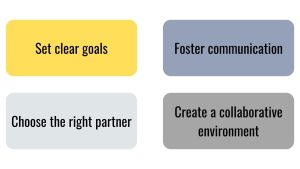content
Team Augmentation
February 4, 2025
6 min read
Introduction
Startups face many challenges. They need to grow quickly, adapt quickly, and manage limited budgets. Hiring a full internal team can be expensive and time-consuming to recruit and train. That’s where team augmentation becomes a game-changer. This strategy allows startups to bring in outside expertise without the long-term commitment of traditional hiring.
What is Team Augmentation?
Team augmentation involves temporarily adding skilled professionals to your existing workforce. These external experts seamlessly integrate into your operations and help meet specific project needs. Unlike outsourcing, you retain control over the team’s tasks and goals.
Why Startups Need It
1. Access to Top Talent Quickly
Startups often need specialized skills immediately. Traditional hiring processes can take months. By scaling your team, you can hire highly skilled developers, designers, or analysts in weeks instead of months.
2. Cost Efficiency
Hiring full-time employees comes with costs beyond just salaries. You need to consider benefits, office space, and equipment. Augmenting teams eliminates these costs. You only pay for the specific services you need, when you need them.
3. On-Demand Scalability
Startups face fluctuating workloads. Launching a new product may require a larger team, while maintenance phases require fewer resources. Team augmentation allows you to scale up or down your workforce as needed.
4. Faster Time to Market
Speed is everything in the startup world. Expanded teams help you complete projects faster by bringing in experts with the right experience. This reduces the learning curve and speeds up development timelines.

Key Advantages for Startups
- Enhanced Flexibility. Augmented teams allow you to quickly adapt to market changes. If a new feature becomes a priority, you can dedicate more talent to it without disrupting core operations.
- Focus on core competencies. Instead of spending time hiring, onboarding, and training, startup founders and managers can focus on strategy and innovation. An extended team handles technical execution.
- Knowledge transfer and innovation. Augmented experts often bring fresh ideas and best practices. This knowledge transfer can benefit the internal team by fostering a culture of innovation and continuous learning.
Use Cases for Team Augmentation in Startups
- MVP development: Building a minimum viable product requires rapid development using diverse skill sets.
- Scaling the product: As user demand grows, scaling the product infrastructure becomes necessary.
- Managing technical debt: Augmented teams can help refactor code and resolve long-standing technical issues.
- Special projects: Sometimes startups require highly specialized expertise, such as AI development or security auditing.

Tips for Successful Team Augmentation
- Set clear goals. Before bringing in augmented experts, define the project’s goals, timeline, and deliverables. This clarity helps ensure alignment.
- Choose the right partner. Choose a partner with experience in your industry. Look for references, recommendations, and examples.
- Foster communication. Effective communication is key to integrating extended teams. Use collaboration tools and hold regular meetings to keep everyone aligned.
- Create a collaborative environment. Treat extended team members as part of your core team. Include them in discussions and decision-making processes.

Conclusion
Team augmentation is a groundbreaking approach for startups. It provides access to top talent, reduces costs, and offers unmatched flexibility. Using this strategy, startups can innovate faster, deliver higher-quality products, and maintain a competitive advantage in the market.
If you have any questions or an idea for a project, contact us via sales@instandart.com or fill out the form on the main page of the site to discuss. We are always ready to help!
